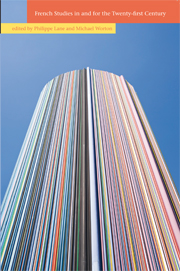Book contents
- Frontmatter
- Contents
- Notes on Contributors
- Foreword by Baroness Jean Coussins
- Foreword by His Excellency Bernard Emié
- Part I Contextualisations
- Part II Research and Public Engagement Strategies
- Part III The Place of Women and Gender in French Studies
- Part IV The Place of Literature
- Part V The Place of Linguistics in French Studies Today
- Part VI Theatre, Cinema and Popular Culture
- Part VII Area Studies, Postcolonial Studies and War and Culture Studies
- 16 An Area Studies Approach in European and Global Contexts: French Studies in Portsmouth
- 17 French Studies and the Postcolonial: The Demise or the Rebirth of the French Department?
- 18 The Development of War and Culture Studies in the UK: From French Studies, Beyond, and Back Again
- Part VIII Adventures in Language Teaching
- Appendices. Addresses to the Future of French Studies Conference
- Index
17 - French Studies and the Postcolonial: The Demise or the Rebirth of the French Department?
from Part VII - Area Studies, Postcolonial Studies and War and Culture Studies
- Frontmatter
- Contents
- Notes on Contributors
- Foreword by Baroness Jean Coussins
- Foreword by His Excellency Bernard Emié
- Part I Contextualisations
- Part II Research and Public Engagement Strategies
- Part III The Place of Women and Gender in French Studies
- Part IV The Place of Literature
- Part V The Place of Linguistics in French Studies Today
- Part VI Theatre, Cinema and Popular Culture
- Part VII Area Studies, Postcolonial Studies and War and Culture Studies
- 16 An Area Studies Approach in European and Global Contexts: French Studies in Portsmouth
- 17 French Studies and the Postcolonial: The Demise or the Rebirth of the French Department?
- 18 The Development of War and Culture Studies in the UK: From French Studies, Beyond, and Back Again
- Part VIII Adventures in Language Teaching
- Appendices. Addresses to the Future of French Studies Conference
- Index
Summary
Introduction
Over the past two decades, we have witnessed what Françoise Lionnet has termed the ‘becoming-transnational’ of French Studies. French and the other modern languages had originally been constructed as academic subjects around the framework of the nineteenth-century European nation-state but, as the primacy of the nation state has come to be challenged in the era of globalisation, this structure has been increasingly questioned by scholars working from transnational, global and postcolonial perspectives. The prominent North American critic Lawrence Kritzman has been prompted to ask, in light of these developments, whether the very existence of French Studies is now in question:
Can French Studies survive the death of the traditional idea of the nation, and the teleology of its progress? Does France's own identity crisis – the loss of its exceptional status, the progressive erosion of its role as an imperial messianic nation, its integration into the European community – endanger our own discipline of French studies?
This chapter considers the specific challenge posed to previous conceptions of French Studies by the field's engagement with the specific ‘transnational’ form of questioning involved in the development of postcolonial teaching and research. Echoing Kritzman's questions cited above, it seeks it to explore whether the development of francophone postcolonial studies represents the demise or the rebirth of the French department.
This is in no way to suggest that postcolonial studies scholars bear all the responsibility/deserve all of the credit (depending upon one's point of view) for the changes that French Studies has undergone as a field.
- Type
- Chapter
- Information
- French Studies in and for the 21st Century , pp. 207 - 219Publisher: Liverpool University PressPrint publication year: 2011



